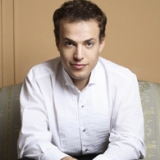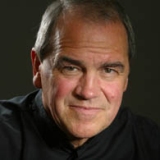Beethoven
held sway as only Beethoven can Friday morning (Dec. 3) at Music Hall with the
third installment of the Cincinnati Symphony Orchestra’s season-long focus on
the Beethoven piano concertos.

Performing the Piano Concerto No. 3 in C Minor on short notice was pianist Orion Weiss, last minute substitute for Jeffrey Kahane, who fell ill earlier in the week. It was Weiss’ CSO debut, though he made an impressive Cincinnati debut in 2002 with the Cincinnati Chamber Orchestra. (The Lyndhurst, Ohio native was only 20 at the time.)
Guest
conductor Hans Graf, music director of the Houston Symphony, presided on the
podium.

They made an arresting pair in the Concerto, which marks a transition from Beethoven’s earlier classically derived style to a more dramatic and emotional one. Graf seemed inclined toward the latter, while Weiss favored the more classical ideal. This was most noticeable in the first movement, with Graf drawing a warmly nuanced introduction from the CSO followed by a more emphatic entrance by Weiss. Graf interleaved the CSO accompaniment with considerable feeling, while Weiss demonstrated poise and daunting technique. This was abundantly clear in the first movement cadenza, which served notice that the name Orion fits him well. (See his delightfully conceived web site www.orionweiss.com for more on things cosmic.)
The intimacy invited by the second movement (Largo) was enhanced by the orchestra’s position downstage in front of the inner proscenium, with the acoustical towers aligned horizontally behind them. Weiss' tone was confidential here, with, again, more effusive expression from Graf and the CSO. They were most aligned, expressively speaking, in the Rondo finale. Ensemble was irreproachable. Entrances and exits were exquisitely dovetailed, and there was a feeling of shared élan.
Graf led Beethoven’s Symphony No. 7 after intermission. It was not of the “not your father’s Beethoven” school, exemplified by CSO music director Paavo Järvi in his exciting traversal of the Beethoven symphonies with the Deutsche Kammerphilharmonie Bremen. It was closer to the one most of us grew up with, featuring somewhat moderated tempos and a full symphonic ensemble. (The CSO strings were reduced by one or two players in each section, for a total of 48, by my count.)
However, there is no "right" way to perform Beethoven, and the Music Hall audience was thrilled with Graf's reading, which went for precision and architecture and drew fine playing from the CSO. There was tenderness in the second movement, buoyancy in the rollicking third. The final Allegro had plenty of brio (spirit) and the soaring brass at the end brought the crowd to its feet.
In view of Järvi's impending departure (in May, 2011), the CSO guest conductor list is under close scrutiny right now. Graf, 61, leaves the Houston Symphony at the end of the 2012-2013 season. He is a wonderful conductor and would be high on anybody’s list of music director candidates. The CSO would be a “lateral” move for him, which would make the job less attractive. Still, the orchestra responded warmly to his leadership, and he enjoyed a solo bow at the end.
The concert opened with a rare performance of Beethoven’s Overture to “The Ruins of Athens” (only the second time in CSO history, the other being in 1973 led by Thomas Schippers). It was a worthy curtain raiser that showed off the CSO’s exceptional woodwinds.
Repeat is 8 p.m. Saturday (Dec. 4) at Music Hall. Tickets, beginning at $10, available at (513) 381-3300 or order online at www.cincinnatisymphony.org
The next concert in the CSO’s Beethoven Piano Concerto series is Jan. 28 and 29 at Music Hall, with Andre Watts performing the Concerto No. 4 and Järvi on the podium.